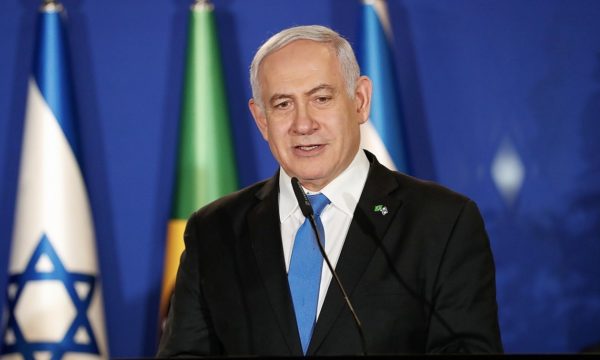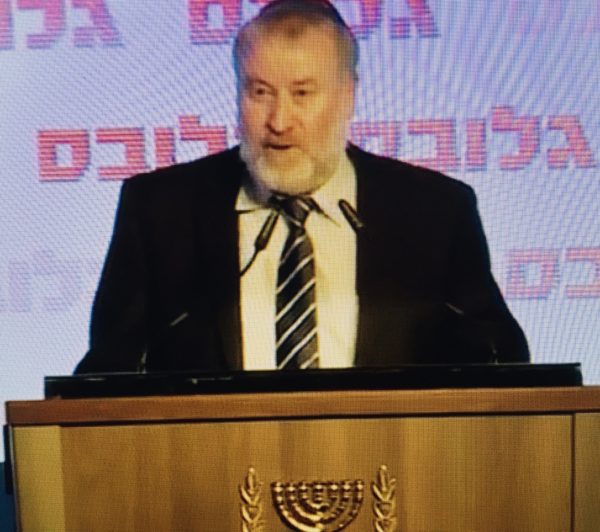Israel is in limbo.
Bereft of an elected government after two inconclusive elections within the past five months, Israel is awash in uncertainty as it heads into a third election next year. As this unprecedented crisis unfolds, Benjamin Netanyahu, the first sitting Israeli prime minister to be indicted on criminal charges, continues to remain in office as Israel’s caretaker leader.

Deeply divided as never before, Israelis are rightly concerned that the current deadlock may not be broken by the forthcoming election on March 2, the third in under a year. These are dark times for one of the world’s most vibrant democracies. That Israel is being compared to dysfunctional states is hardly surprising.
It has a come to this because Israeli society is so riven and fractured. In Israel’s quarrelsome multiparty proportional representation system, no single party has ever won an outright majority. Coalition governments have been the norm in Israel’s 71-year entire existence.
Israel was plunged into uncertainty yet again on December 11, the deadline for negotiating a power-sharing agreement following the September 17 election. Netanyahu, the head of the right-wing Likud Party and Israel’s longest serving premier, fell short of cobbling together a government. His chief rival, Benny Gantz, the leader of the centrist Blue and White Party and the former chief of staff of the Israeli armed forces, also failed to form a government.
Netanyahu and Gantz both needed the support of Avigdor Liberman’s secular right-wing Yisrael Beteyenu Party to amass a majority of at least 61 seats in the 120-seat Knesset. Liberman, the former foreign and defence minister who holds the balance of power in the current situation, called for a unity government consisting of three parties — Likud, Blue and White and his own party. Liberman’s scenario came to naught after Netanyahu and Gantz were unable to resolve their differences.
The unenviable situation in which Israel finds itself today is the direct result of the April 9 election, the first one in Israeli history which did not produce a government. The Likud finished in second place, one Knesset seat behind Blue and White, but had the support of two right-wing parties and two ultra-Orthodox parties and was only one seat shy of a majority. Much to Netanyahu’s chagrin, Liberman played the role of spoiler, refusing to join his coalition due to disagreements over an ultra-Orthodox enlistment law.

In short order, Netanyahu dissolved the Knesset and called a new election, thereby blocking Gantz ‘s chance to try to establish a government. The election in September resulted in a virtual draw, prompting Netanyahu to assemble a bloc of 55 right-wing parliamentarians. By contrast, Gantz could only muster a bloc of 44 parliamentarians, plus 10 Israeli Arab Knesset members. In light of these numbers, Israeli President Reuven Rivlin gave Netanyahu the first opportunity to form a government. When Netanyahu hit a brick wall, Rivlin passed the mandate on to Gantz, who similarly failed to assemble a government.
Amid the horse trading, Attorney-General Avichai Mandelblit, Netanyahu’s ex-cabinet chief, delivered a shock by indicting Netanyahu on charges of bribery, fraud and breach of trust. Netanyahu denies all wrongdoing and has darkly likened Mandelblit’s decision to an “attempted coup.”
To no one’s surprise, Netanyahu and Gantz have blamed each other for the impasse.
Claiming he had offered Gantz significant compromises so that a broad national unity government could be created, Netanyahu complained that Gantz had not budged even a millimeter during their negotiations. “And so, to my sorrow, we are sliding toward a completely unnecessary third election that none of us want.”
Gantz presented an entirely different story to the media. “Despite my hopes, Netanyahu did not offer anything new that would prevent unnecessary elections,” he said.
According to Gantz, Netanyahu refused to promise not to seek immunity from prosecution in the three corruption cases. Netanyahu has not indicated whether he will ask for immunity, but he might accept Liberman’s proposal to retire from politics in exchange for a pardon. Gantz has said he would seriously consider this idea.
With their discussions having floundered, Gantz accused Netanyahu of holding Israelis “hostage” to his legal woes. “Netanyahu needs to place Israel before Netanyahu,” he said in a sharp dig. “I call on the prime minister again: if you give up on immunity, we’re partners to start talking.” He added, “No Israeli leader, right or left, never dared to imagine the state belonged to him.”
Gantz’s associate, Moshe Ya’alon, the former defence minister, disclosed that Blue and White would not join Netanyahu in a coalition unless he was cleared of all criminal charges. As Gantz elaborated, “I demand that he respect his defeat in the election, respect the decision of the legal system led by people he himself appointed, and respect the desires of the majority of the country. The State of Israel and the people of Israel are not under the private ownership of any leader.”
Netanyahu, too, refused to negotiate without his 55-strong bloc. Gantz, who has the backing of the Labor Party, the Democratic Camp and much of the Arab Joint List, demanded that the Likud should exclude the following parties from negotiations : Shas, New Right, United Torah Judaism and Jewish Home and National Union.
In addition, Netanyahu insisted he should be the first to assume the premiership under a rotation agreement, a demand that Gantz roundly rejected. Working on the assumption that Netanyahu could be exonerated, Gantz offered Netanyahu a deal in which he, Gantz, would serve as prime minister in the first two years, after which Netanyahu would replace him for the next two years.
As the bickering escalated, Liberman published a list of demands, calling for civil marriage and public transportation on the Sabbath. Netanyahu, given his alliance with haredi parties, could not honor these demands. Gantz, however, expressed a readiness to embrace them.

With the acrimony rising to new levels, the Likud encouraged its supporters to denounce the criminal justice system and the news media. In a thinly veiled critique of Netanyahu, Mandelblit condemned this orchestrated campaign of “lies,” “threats,” and “baseless slander.”
With the December 11 deadline for forming a new government fast approaching, Netanyahu adopted a new tactic. His spokesmen argued that he was indispensable by virtue of his close relationship with U.S. President Donald Trump, whose Republican administration has hewed to a pro-Israel course. Netanyahu and his backers suggested that only he can convince Trump to endorse his plan to annex the Jordan Valley, to sign an Israel-U.S. defence treaty, and to sell Israel super bunker-busting bombs, which could be deployed should Israel ever decide to bomb Iran’s nuclear facilities.
With this in mind, Energy Minister Yuval Steinitz, Netanyahu’s stanch ally, implied that Israel could be embroiled in a war with its arch enemy, Iran, in the next six months, and that Netanyahu should be at Israel’s helm should hostilities erupt.

Despite his popularity within the Likud, there is no certainty that Netanyahu will lead it into the next election. Gideon Saar, the former minister of interior, has called for Netanyahu’s resignation and also challenged his leadership. A primary is scheduled to be held on December 26.
If, as expected, Netanyahu fends off Saar’s challenge, he may run headlong into a new problem. The Supreme Court has asked Mandelblit to rule whether a politician indicted on criminal charges should be permitted to head a new government. Mandelblit will hand down his momentous verdict soon. It could throw Israeli politics into further chaos.
